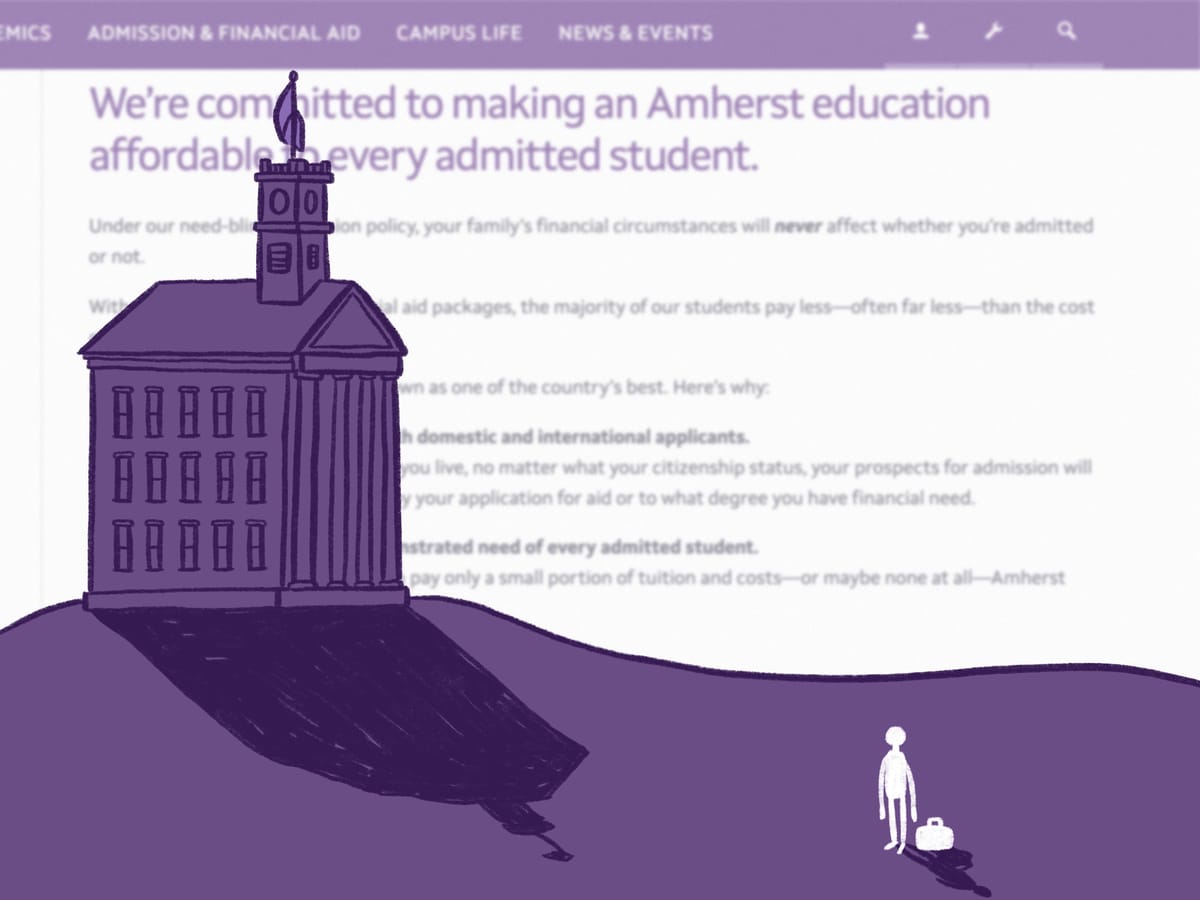When Financial Aid Fails
Staff Writer Willow Delp ’26 shares the story of Zoe Callan ’25 and criticizes the college’s failure to live up to its reputation of generous financial aid policies.

Amherst College prides itself on its progressive financial aid policies. It claims to be a loan-free school that fully meets demonstrated financial need for all students. Its website affably advertises its generous policy under “Financial Aid & Costs,” assuring prospective students that “If your family shows that it can pay only a small portion of tuition and costs — or maybe none at all — Amherst pays the rest.”
For Zoe Callan ’25, this isn’t the case.
Two years ago, she traveled across the country from her home in Albuquerque, New Mexico, excited to embark on a new adventure and explore the world. She was interested in Amherst’s study abroad programs, and knew a member of the Native and Indigenous Students Association (NISA), who urged her to enroll.
Since becoming a student, Callan has been incredibly active on campus — as a registered member of the Navajo nation, she serves on the e-board of NISA. She is a member of the Ace/Aro Grey Space and the Stage Combat Club. She’s on the e-board for Amherst Safe Space for Kinksters. She has acted in multiple Green Room shows and has held an array of different jobs on campus since her freshman fall — at the Fitness Center, the Science Center café, at Grab-n-Go, for the communications office, and for the Phonathon. She’s an English and Spanish double major and speaks fondly of classes she’s taken, such as “Emily Dickinson” with Professor of American Studies and English Karen Sanchez-Eppler. She has also taken advantage of the Center for Counseling and Mental Health. Although her Amherst experience has been stressful at times, she’s made strong connections with friends and professors and enjoyed the school’s programming and student organizations.
But Callan will have to leave campus after this semester. In just two years, she has accumulated $30,000 in student loan debt.
Callan’s situation is somewhat unique, as she entered the college as a dependent student but became an independent student after getting married in 2022. Dependent students need to report all guardians’ financial information, while independent students only report their own financial information. With the change, it would be cheaper to go to her state university in New Mexico and pay full tuition than to continue attending Amherst with her current financial aid. The initial financial aid offer she received this year was not promising, but she believed that it would improve after being reviewed in Jan. 2022, when her mother quit her job to take care of Callan’s grandmother. It didn’t. Despite all that she had done for Amherst, the college did nothing for her in return.
Callan has tried hard to stay at Amherst. She has attempted to appeal, and has met with the financial aid office several times, all with minimal success. “I have never left a meeting with financial aid without crying,” Callan told me, “I’ve heard that it’s not an uncommon experience.” The last person she spoke with seemed like he cared, she said, but didn’t actually do anything useful or helpful. She was told they would look at her application “‘with as much compassion as possible,”’ which has produced little concrete action. “At this point, I’m just so tired,” Callan said. “It’s really hard to keep trying when, after everything, it just feels hopeless.”
When asked about her plans for the future, Callan admitted that she wasn’t entirely sure. “I have applied to other institutions to transfer,” she said. “I’d love to stay here, but I just can’t do it anymore.” The process of trying to secure sufficient financial aid has been “stressful for [her], stressful for family, stressful for friends.” She says that she “can’t keep holding out hope for a miracle.”
Amherst’s need-based financial aid seems ideal on its surface. But as Callan pointed out, “The problem with need-based financial aid is that the college determines your need … They can do that in a variety of ways that don’t necessarily match what you can afford to do.” Another major pitfall of the model is that outside scholarships are calculated against determined need, so Callan cannot benefit from her veteran father’s GI Bill education benefits. Receiving outside aid would lessen the impact of her existing aid from Amherst. She implores the administration to reconsider their financial aid policy regarding outside scholarships “because it hurts so many people.”
Callan urges students to “know the policy. Don’t be afraid to advocate for yourself. Know that you’re not alone. This is an exhausting, stressful thing, and it’s OK if sometimes that’s overwhelming, and it’s also okay to go somewhere else where that’s not a problem if you need to.”
While many students can, thankfully, benefit from financial aid, there are glaring gaps for those who don’t fit the mold. Callan’s situation reflects a failure of the ostensibly need-based system that Amherst claims to offer. She has invested two years of hard work at Amherst, and for her diligence, ingenuity, and leadership, she has received tens of thousands of dollars in debt. The college must do better to accommodate Callan and all students suffering from a similar plight. Until all need is truly met, Amherst cannot call itself “loan-free.”


Comments ()